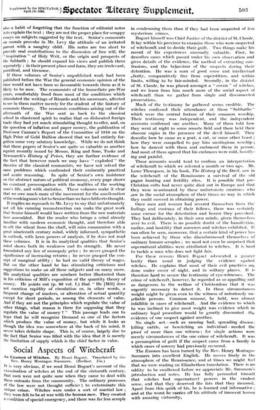• Aspects . °octal spects of Witchcraft An Examen of Witches.
By Henri -Boguet. Translated by the Rev. Henry Montague Summers. (Rodker. 25s.) IT is very obvious, if we read Henri Boguet's account of the examination of witches at the end of the sixteenth century, that men were not quite sane when they came to deal with these outcasts from the community. The ordinary processes of the law were not thought sufficiert to exterminate. this unique crime. Witches were _under a sort of martial law ; they were felt to be at war with the hunian race. •They created a condition of special emergency, and there was far less scruple
in condemning them than if they had been suspected of less mysterious crimes.
Boguet himself was Chief Justice of the district of St. Claude, It lay within his province to examine those who were suspected of witchcraft and to decide their_guilt. Two things make his record of his experiences unusually valuable. First, he describes cases which passed under his own observation and gives details of the evidence, the method of extracting con- fessions, and. the behaviour of the suspects during their detention. He was a man of good sense and intellectual clarity, comparatively free from superstition, and within limits, willing to be fair-minded. Secondly, in the district of St. Claude, he was placed amongst a " coven" of witches, and we learn from him much more of the social aspect of witchcraft than we gather from single and disconnected prosecutions.
Much of the testimony he gathered seems credible. The witches confessed their attendance at those "Sabbaths', which were the central feature of their common worship. Their testimony was independent, and the '.independent accounts confirmed one another. Many of them told how they went at night to some remote field and there held their obscene orgies in the presence of the devil himself. They describe how he came as a goat, a cat, or some other beast ; how they were compelled to pay him sacrilegious worship ; how he danced with them and embraced them in person. And most of them agreed that his embraces were cold, horrify- ing and painful.
These accounts would tend to confirm an interpretation of witchcraft to which we referred a month or two ago. Mr. Lowe Thompson, in his book, The History of the Devil, saw in the witchcraft of the Renaissance a survival of the 'old pagan hunting and fertility rites. It is possible that pre- Christian cults had never quite died out in Europe and that they were re-animated by these unfortunate creatures who saw in the social atmosphere of their times no way in which they could succeed in obtaining power.
Once men and women had severed themselves from the feelings and customs of their fellows, there was certainly some -excuse for the detestation and horror they provoked. They had deliberately, in their own minds, given themselves over to evil. There is no possible doubt of the humiliation, malice, and hostility that sorcerers and witches exhibited. It can often be seen, moreover, that a certain kind of power has been achieved by those who disembarrassed themselves of ordinary human scruples ; we need not even be surprised that supernatural abilities were attributed to witches. It is hard to tackle a man who does not fight fair.
For these reasons Henri Boguet advocated a greater laxity than usual in judging the evidence against witches. He explains that most of their evil practices arc done under cover of night, and in. solitary places. It is therefore hard to secure the testimony of eye-witnesses. The crime of witchcraft, however, he regarded as so appalling and so dangerous to the welfare of Christendom that it was urgently necessary to detect it. In these circumstances weight might be given even to the witness of notoriously un- reliable persons. Common rumour, he held, was almost infallible in cases of witchcraft. And the evidence to which . . evidence he was inclined to give most weight ws n which in ordinary legal procedure would be greatly discounted- --the evidence of one suspect against another.
No single act—such as causing hail, spreading disease, killing cattle, or bewitching an individual—needed the proof of more than one witness ; for single actions were merely circumstances of the one crime of witchcraft. It was a presumption of guilt if the suspect came from a family in which cases of sorcery had previously occurred.
The Examen has been turned by the Rev. Henry Montague Summers into excellent English. He moves freely in the atmosphere of the Renaissance, and at times we might feel that we were reading an Elizabethan translation. There is an oddity to be swallowed before we appreciate Mr. Summers's introduction and notes. He has fully persuaded himself that witches had supernatural powers in the crudest sense, and that they deserved the fate that they incurred. Apart from this quirk of his, he is learned and informative ; and at the worst he carries off his attitude of innocent horror with amazing virtuosity.


















































 Previous page
Previous page